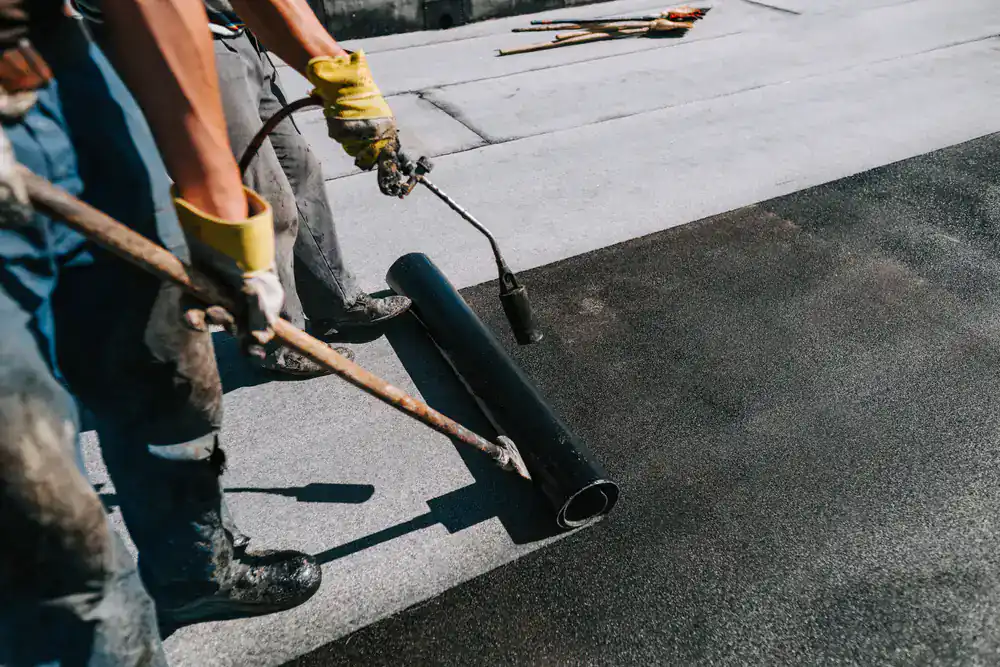
Hear from Our Customers
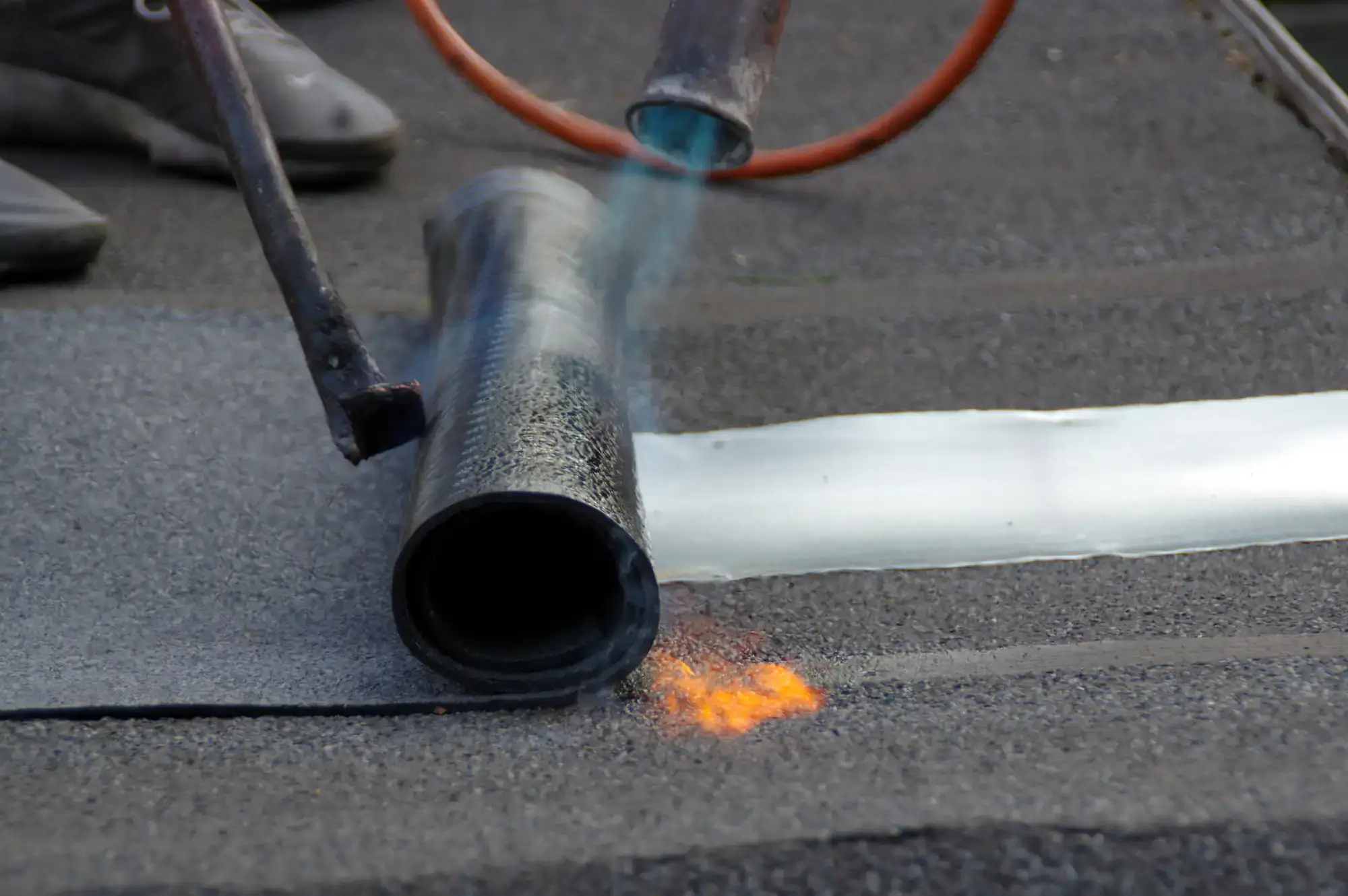
No more emergency buckets during rainstorms. No more wondering if your flat roof will hold up through another Long Island winter. With professional torch down roofing, you get a seamless, waterproof membrane that actually works.
The modified bitumen system creates a watertight seal that handles everything Smithtown weather throws at it – from heavy snow loads to summer heat that reaches 150°F on dark roofs. Your building stays dry, your energy costs drop, and you stop worrying about the next storm.
This isn’t just another roof covering. It’s a complete waterproofing system designed to expand and contract with temperature changes without cracking or failing like cheaper alternatives.
We’ve been Long Island’s go-to roofing contractor since 2002. We’re not the company that shows up, does the work, and disappears – we’re the family-owned business your neighbors have trusted for over two decades.
We’ve seen what happens when torch down roofing is done wrong. Open flames, improper sealing, shortcuts that lead to leaks within months. That’s why we only use certified technicians who understand the precision required for safe, lasting installation.
Our track record speaks for itself: thousands of satisfied customers across Suffolk County who haven’t had to think about their roof since we installed it. When you’re dealing with a system that requires propane torches and specialized techniques, experience isn’t just helpful – it’s essential.
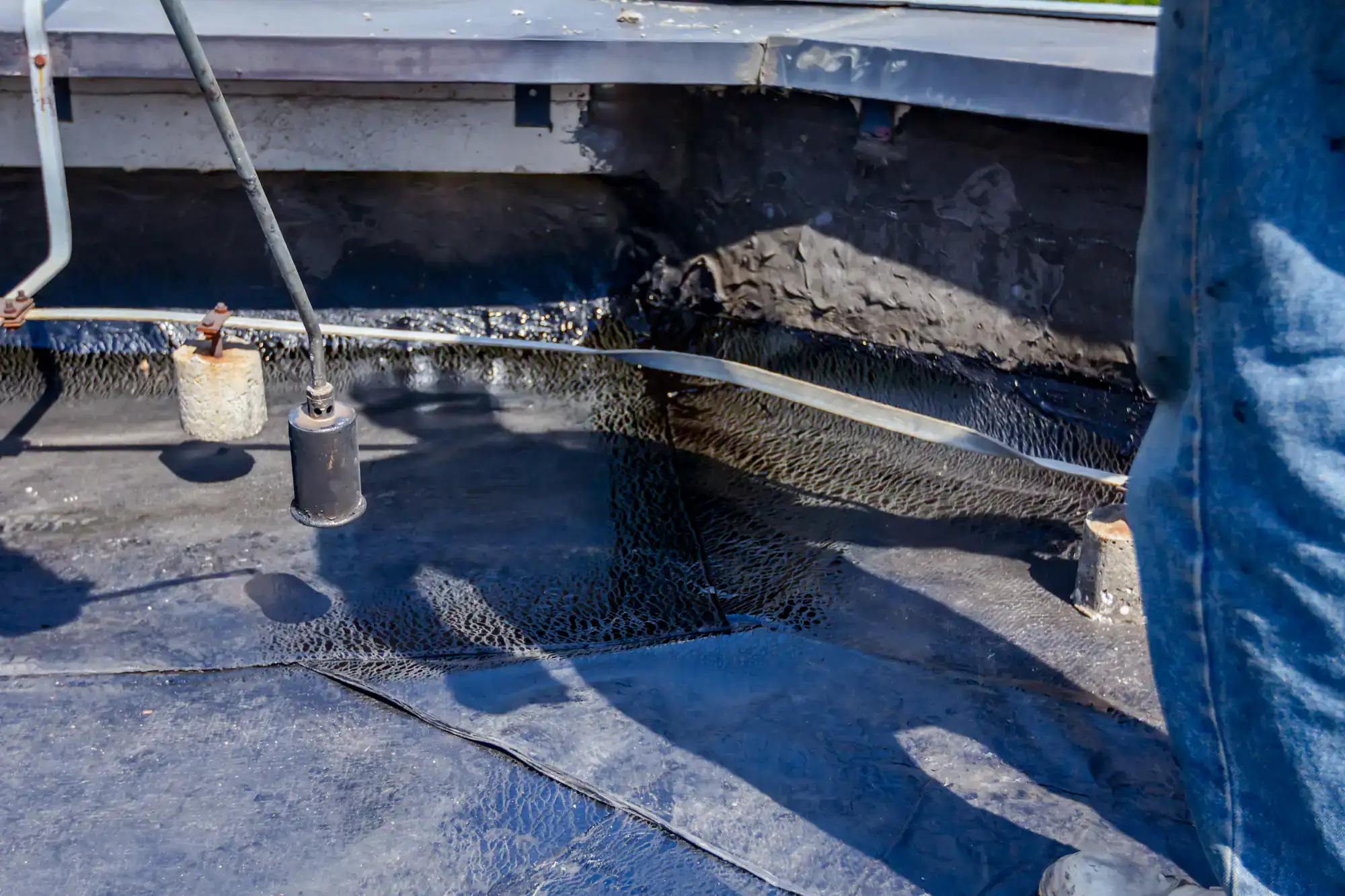
First, we assess your existing roof structure and prepare the surface. This includes installing proper insulation – crucial for Long Island’s cold winters – and ensuring the substrate is level to prevent water pooling.
Next comes the modified bitumen membrane application. Using hand-held propane torches, our certified technicians heat the APP-modified bitumen material to the exact temperature needed for proper adhesion. The heated membrane bonds directly to the roof surface, creating seamless seams that won’t separate.
For three-layer systems, we apply the base sheet first, then the smooth cap sheet, and finish with a granulated surface layer that provides UV protection and energy efficiency. Each layer is torched and sealed with precision to ensure no weak spots or gaps.
Finally, we install proper flashing around penetrations like vents and HVAC units, using self-adhering membranes and metal flashing to complete the waterproof system. The result is a roof that will protect your property for 20+ years with minimal maintenance required.
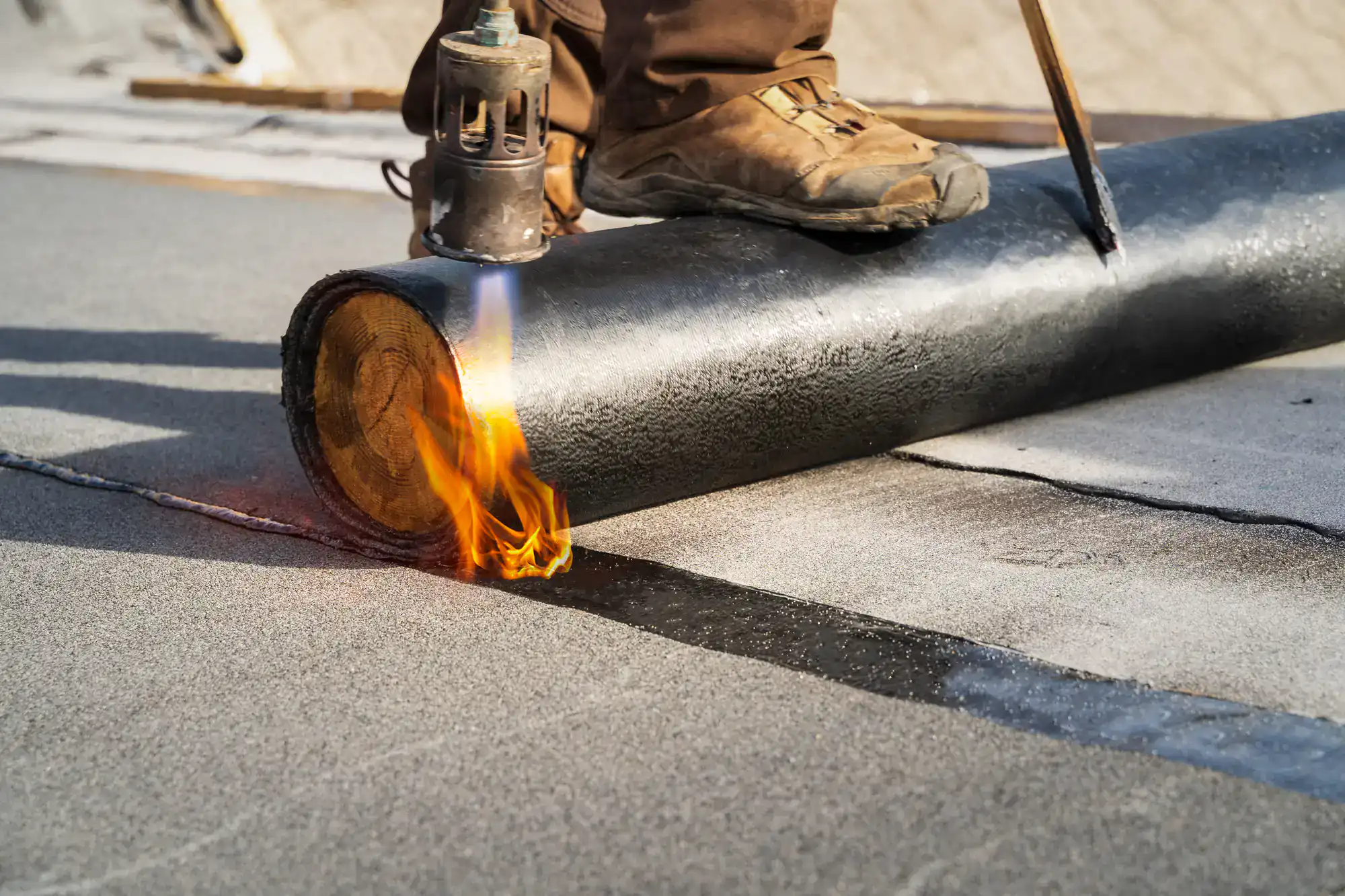
Ready to get started?
Your torch down roofing system includes professional-grade APP or SBS modified bitumen membranes designed specifically for Long Island’s climate. These materials handle temperature swings from below freezing to over 100°F without cracking or melting.
The seamless installation eliminates the weak points that cause most flat roof failures. Unlike rolled roofing or patch jobs, torch down creates a continuous waterproof barrier that won’t separate at the seams during thermal expansion.
In Smithtown specifically, this matters because of our heavy snow loads and frequent freeze-thaw cycles. Traditional flat roofing materials often fail at seams when ice dams form and melt repeatedly. Torch down roofing’s flexibility and seamless design prevent these common failure points.
You also get excellent UV resistance and energy efficiency. The granulated cap sheet reflects heat rather than absorbing it, which can reduce your cooling costs during Long Island’s hot summers. Most importantly, you get peace of mind knowing your roof will perform reliably for decades, not years.
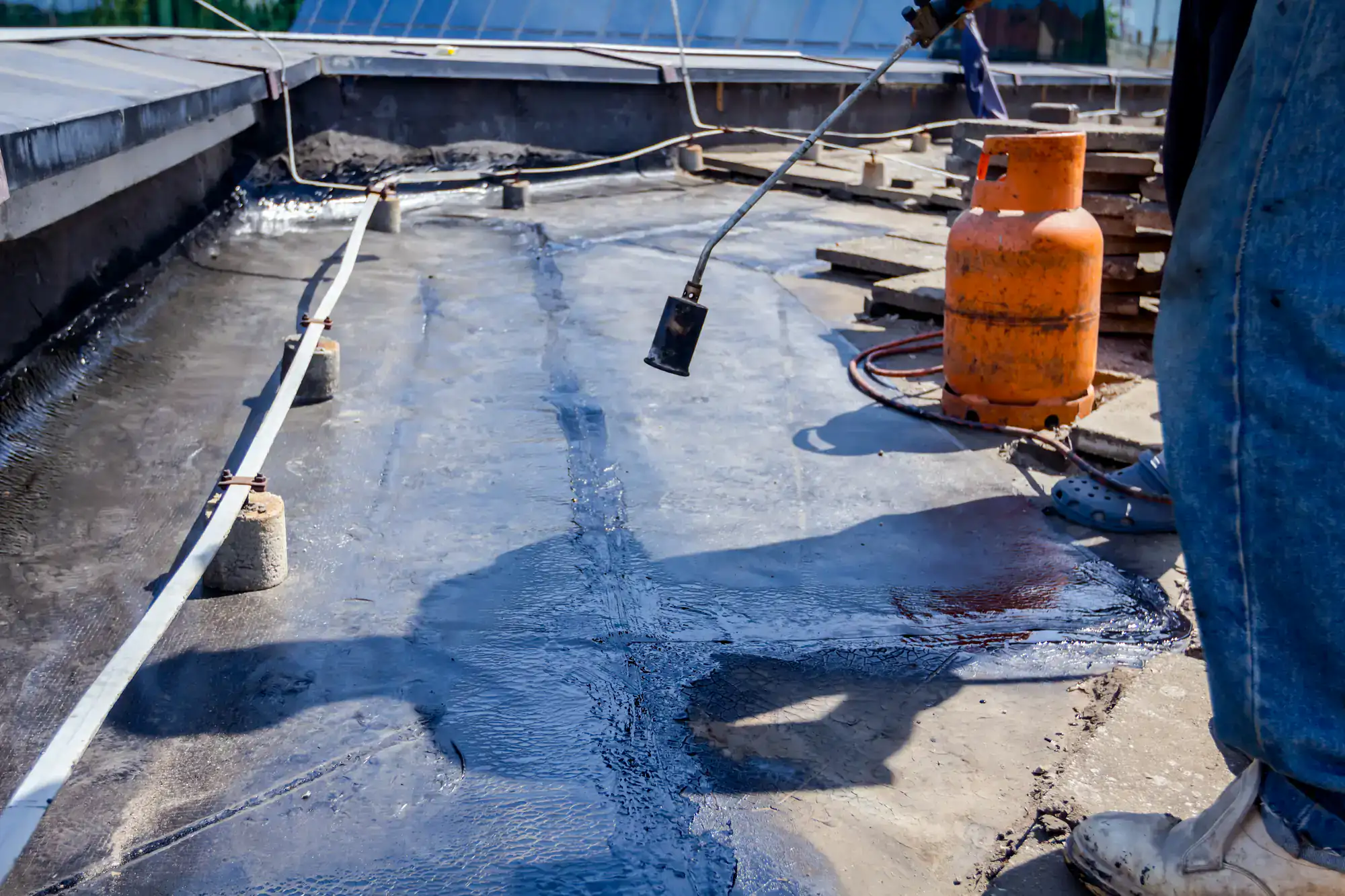
Properly installed torch down roofing lasts 15-20 years or more in Smithtown’s climate, often outlasting other flat roofing systems by 5-10 years. The key is professional installation and the material’s ability to handle Long Island’s temperature extremes.
Modified bitumen is specifically designed to expand and contract without cracking during freeze-thaw cycles that are common here. Unlike EPDM rubber or built-up roofing that can become brittle in cold weather, torch down maintains its flexibility year-round.
The longevity also depends on proper maintenance, but torch down requires minimal upkeep compared to other systems. Annual inspections and clearing debris from drains is usually sufficient to maximize the lifespan.
When installed by certified professionals like our team, torch down roofing is completely safe. The safety concerns come from DIY attempts or hiring inexperienced contractors who don’t follow proper protocols.
Our technicians are trained in fire safety procedures and carry proper insurance. We inspect the work area for flammable materials, have fire extinguishers on site, and follow all local building codes. The propane torches are controlled precisely to heat the membrane without overheating or creating fire hazards.
The biggest risk is actually hiring someone without proper training. Overheating the bitumen can break down the material and create flammable conditions. That’s why this isn’t a DIY project and why choosing an experienced contractor is crucial for both safety and performance.
APP (Atactic Polypropylene) and SBS (Styrene Butadiene Styrene) are both types of modified bitumen, but they have different properties that make them suitable for different applications.
APP is more rigid once installed and requires higher temperatures during installation. It provides excellent UV resistance and creates a plastic-like surface that’s ideal for areas with high sun exposure. APP systems typically last longer and are better for roofs with minimal foot traffic.
SBS is more flexible and becomes sticky at lower temperatures during installation. It’s better for areas that experience significant thermal movement or occasional foot traffic. Both types create waterproof seals, but the choice depends on your specific building’s needs and local climate conditions. We’ll recommend the best option based on your roof’s characteristics.
In many cases, yes, but it depends on the condition of your existing roof and local building codes. We need to evaluate the structural integrity, moisture content, and compatibility of the existing system before making recommendations.
If your current roof is structurally sound and dry, torch down can often be installed as a recover system, which saves on tear-off costs and disposal fees. However, if there’s moisture damage, multiple layers already present, or structural issues, a complete tear-off may be necessary.
Building codes in Suffolk County limit the number of roof layers allowed, typically to two or three depending on the building type. We’ll inspect your roof and provide honest recommendations about whether a recover installation is appropriate or if a full replacement is the better long-term solution.
Torch down roofing requires minimal maintenance compared to other flat roofing systems, which is one of its main advantages. Annual inspections and basic upkeep are usually sufficient to maintain the warranty and maximize lifespan.
Regular maintenance includes clearing debris from drains and gutters, checking for any punctures or damage from foot traffic, and ensuring the membrane surface is clean. The granulated surface should be inspected for excessive wear, and any small issues should be addressed promptly to prevent larger problems.
Most minor repairs can be handled easily by patching with additional membrane material and re-sealing with a torch. Unlike systems that require complete section replacement, torch down allows for spot repairs that blend seamlessly with the existing roof. We offer maintenance programs to handle these inspections and minor repairs automatically.
Torch down roofing offers superior waterproofing and durability compared to TPO or EPDM, especially in climates like Long Island’s with significant temperature variations and weather extremes.
TPO is lightweight and reflective, but the seams are mechanically fastened or chemically welded, creating potential failure points. EPDM rubber can become brittle in cold weather and is more susceptible to punctures from debris or foot traffic.
Torch down creates a seamless, monolithic membrane with no mechanical fasteners to fail. The heat-welded seams are actually stronger than the base material, eliminating the weak points that cause most flat roof leaks. The modified bitumen also maintains flexibility in cold weather while providing excellent puncture resistance. For Long Island’s harsh climate conditions, torch down simply provides more reliable, long-term protection.